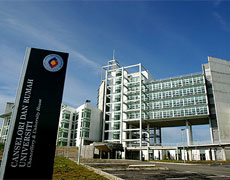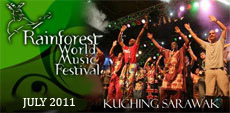

IWIPS 2011
will be collocated with
7th International Conference on IT in Asia
CITA'11
IWIPS 2011 is supported by:
Human Factors Ergonomics Society,
Malaysia
Conference Dinner
The conference dinner will be held at
Hilton Hotel

Social Event
The social event night will be held at
University House

Other Social Event
Follow IWIPS 2011 on
IWIPS 2011 Panel Session
PANEL 1
Name of Panel:
|
Product Globalization, EQUID, Cultural and Affective Design
|
Name of Chair: |
Dr. Halimahtun M. Khalid
|
Email Address of contact person:
|
halimahtun@damai-sciences.com
|
Panelists: |
Overview This panel aims to address three related issues that are pertinent to internationalization of products and systems, namely: product globalization, ergonomics quality in design, cultural and affective design , with the goal of stimulating discussions among participants in the workshop. There are three main aspects of product globalization: (1) Management of internationalization and localization, (2) Guidelines to facilitate successful global design, and (3) Processes required in implementing global products. The assumptions in product design are that the product is “neutral,” “one size fits all,” and by removing all culturally specific features from the product affects changes at the interface level but not the functionality. Today with global markets, every product has users with different cultural beliefs, history, and practices. One goal is to design a product that is useful and satisfies all user expectations and cultural norms. This is not an easy task; it is unlikely that one designer will have knowledge of the cultures for which a product is targetted. Guidelines in global design can be used, but there are advantages and disadvantages that need to be addressed. Users are increasingly more aware of the ergonomics design of products. For a variety of products in different markets it is simply not enough to have many functions and/or an aesthetic design. User oriented design of products is a key factor for economic success. The usefulness of ergonomics for design processes and for strategic management led to the E rgonomics Q uality i n D esign ( EQUID) initiative by the International Ergonomics Association (IEA). The global objective of EQUID is to promote the integration of ergonomics into the design process, besides supporting the public to make more informed decisions about the ergonomics quality of products. A basic requirement of the EQUID approach is to have a comprehensible and transparent documentation of the user participation within the product development process. However, EQUID has yet to consider affective and cultural requirements in its framework. One reason being that designers tend to understand functional requirements better . An emerging aspect of product internationalization is Affective Engineering, which is concerned with measuring people's affective responses to products. It is now an expanding method for use in research and in the industry. Approaches to affect include understanding how one can measure and analyse human reactions to affective and pleasurable design, and how one can produce affective design features of products for the global market. However, both product globalization and EQUID have yet to consider affective design in product development processes. M ethods may be developed to measure user experience in terms of affective responses. |
|
|
Panelist 1: Topic - Product globalization and EQUID
Dr. Khalid has about 35 years of research experience in affective design, mass customization, multicultural cognition, disaster attitudinal modeling, multimedia, virtual reality, and speech recognition. She was Co-Technical Manager of the EU IST CATER Project (C.N. 035030), where she pioneered the citarasa engineering method. She has published more than 150 papers in refereed journals and conference proceedings. She is editor of Virtual Reality and co-author of Affective Engineering & Design chapter in the Handbook of Human Factors and Ergonomics (Wiley). Presently, she consults with CapitaLand and ExxonMobil in office ergonomics and Mimos Berhad in product ergonomics. She has consulted with PFC Engineering, Petronas Gas Berhad, Nokia UK, Mustang International, Sarawak Shell Berhad, Honeywell Inc., MicroUsability, Ministry of Trade & Industry (Singapore), Scholle Pty Ltd (Australia), and the US Air Force. Dr. Khalid is President of the South East Asian Network of Ergonomics Societies, and Protem President of the Human Factors and Ergonomics Society Malaysia. She is Past Chair of the Standing Committee of Science Technology & Practice of the International Ergonomics Association (IEA), and current Chair of the IEA Affective Design Technical Committee. She is also a Fellow of the IEA. |
|
|
Panelist 2: Topic - Innovative design for global markets
. |
|
|
Panelist 3 : Topic - Indigenous Cultures, Innovation and Design for Global Markets
Dr. Yeo is also a specialist in Human Computer Interaction (HCI) research, specifically in software internationalisation, multimodal interaction, gazed based systems, and the use of ICTs for the preservation of indigenous languages. He currently heads the Sarawak Language Technology (SaLT) Research Group, and is involved in two European Union projects, besides several national projects. Dr. Yeo has published a chapter in The Encyclopaedia of Developing Regional Communities with ICT, evaluated Malaysian federal-funded ICT4RD initiatives, and worked with United Nations Economic and Social Commission for the Asia Pacific (UNESCAP). He has been involved in the eBario Project which garnered numerous awards, including the Commonwealth CAPAM Innovation award, against 112 international submissions worldwide. At the national level, he is a member of the pro-tem committee of the Human Factors and Ergonomics Society, Malaysia, besides the University representative in the national Language Cluster Research. He is a Member of the Expert Review Panel for the ICT “National Brain Gain Programme” Sub-sector, appointed by the Academy of Sciences Malaysia. |
|
|
Panelist 4: Topic - Affective design for global markets
Martin G. Helander, CHFP, PhD (Chalmers University, Sweden), is Professor at the School of Mechanical and Aerospace Engineering, Nanyang Technological University (NTU), Singapore, and past Head of the Systems & Engineering Management Division. For the past 10 years he has been Director of the Human Factors Program at NTU, besides founder of a similar program at Linköping University, Sweden. He has taught Human Factors Engineering and Product Design for over 35 years. He has 300 publications and 10 books including the first Handbook of Human-Computer Inte raction (Elsevier), Introduction to Human Factors and Ergonomics (CRC/Taylor & Francis). He previously held faculty positions at University at Buffalo, USA; Linköping University, Sweden, and visiting appointments at MIT and HKUST, Hong Kong. He was also a Senior Scientist with Human Factors Research, Inc. Santa Barbara, CA. Prof. Helander is Principal Consultant with Damai Sciences Pte Ltd, Singapore. He has extensive consulting experience with Industry and Government, including AT&T, Bell Laboratories, Computer Consoles Inc., Eastman Kodak, Ericsson, ExxonMobil, Herman Miller Inc., Honeywell, Inc., IBM Corporation, Ingersoll Rand Corporation, Ministry of Manpower (Singapore), Motorola, NIOSH (USA), National Research Council (USA), Saab Aerospace, Seagate Inc., Shell Inc., Steelcase Inc., Swedish Defense Research Agency, UCLA, Xerox Corporation, U.S. Air Force, Mimos Berhad and Petronas Gas Berhad. His research expertise includes axiomatic design, process control, affective design, patient safety, and mobile devices. He was Project Leader of WP6 in the EU-CATER Project, and a member of the Advisory Board of EU-SEACOOP project. Prof. Helander is Past President of the International Ergonomics Association, and Past Chair of the Affective Design TC. He is a Fellow of the IEA, HFES and Ergonomics Society, UK.
|
|
|
Panelist 5 : Designing for local/global markets : the case of Mimos Berhad
En. Fauzi holds several US Patents and Publications in International journals. He graduated with Bachelor of Science in Mechanical Engineering from GWU, Washington DC. His previous work experience includes Solectron Technology, and Motorola Research and Development group. He was in Motorola for 18 years where he developed two-way radios, cordless phone and energy products. His favourite quote is “Risk comes from not knowing what you're doing” by Warren Buffet. |
PANEL 2
Special Track:
RE-FRAMING HCI THROUGH LOCAL AND INDIGENOUS PERSPECTIVES
One of the current challenges for HCI as a discipline is addressing the tensions created between local cultures and the assumptions, priorities and values embedded in this discipline. Translating local knowledge into valid and useful HCI tools is not a simple problem, but one that requires re-defining and re-negotiating disciplinary boundaries (and connections) and the subject and object of interaction design. Focusing on local or indigenous awareness and practices in design pushes the envelope in a very exciting way. For instance, the democratic values of equal participation driving user-centred design are not necessarily shared by local communities which prioritize respecting the views of their leaders. Addressing these gaps requires a fresh look at how diverse disciplines and professions explore and conceptualize the relation between users, designers and other stakeholders. While the global HCI community has well-defined conceptual and methodological frameworks, there is little research about how local HCI professionals experience, adapt and implement this knowledge, nor how to locate HCI so that it is locally accountable (Suchman, 2002). To progress this research we must start by better understanding relationships between HCI concepts and methods and their meanings to local and indigenous groups. Universal perspectives on HCI like ethnology and ethnography, e.g., technomethodology (Dourish and Button, 1998), and national culture models (Hofstede, 2001) and activity theory (Kaptelinin & Nardi, 2006) have all had an impact in the design of interactive systems for culturally different users, but the potential contribution of explicitly local or indigenous perspectives, approaches and experiences with HCI, see e.g., (Kurosu et al, 2004), have not become so clear and uniform. Furthermore, the idea of what constitutes a useful and usable system in different cultural contexts remains partially explored at the very least. It is hoped this workshop will further our understanding of these issues and lead to practical recommendations for people researching and implementing HCI at global and local levels.
The topics include, but are not limited to, the following areas:
Examples of indigenous product design
• Overview of related work in HCI and CSCW (especially portable ICT-related devices and systems);
• Critiques of earlier approaches to design;
• Related work on participatory design;
• Actionable recommendations and guidelines for the conception, design and evaluation of interactive systems from local perspectives;
• Improved methods for the gathering and elicitation of issues when implementing standard HCI perspectives into local contexts;
• Understanding participatory design as a sociotechnical endeavour in HCI.
AIM
The aim of the workshop is to present different local and indigenous perspectives from all over the world to lead into an international dialogue on re-framing concepts and models in HCI/Interaction Design.
Organizers:
Jose Abdelnour-Nocera – Thames Valley University, UK
Masaaki Kurosu - Open University of Japan, Japan
Torkil Clemmensen, Copenhagen Business School, Denmark
Program committee:
Nic Bidwell, CSIR-Meraka & Nelson Mandella Metropoliton University, South Africa
Ravi Vatrapu, Copenhagen Business School, Denmark.
Heike Winschiers-Theophilus, Polytechnic of Namibia, Namibia






